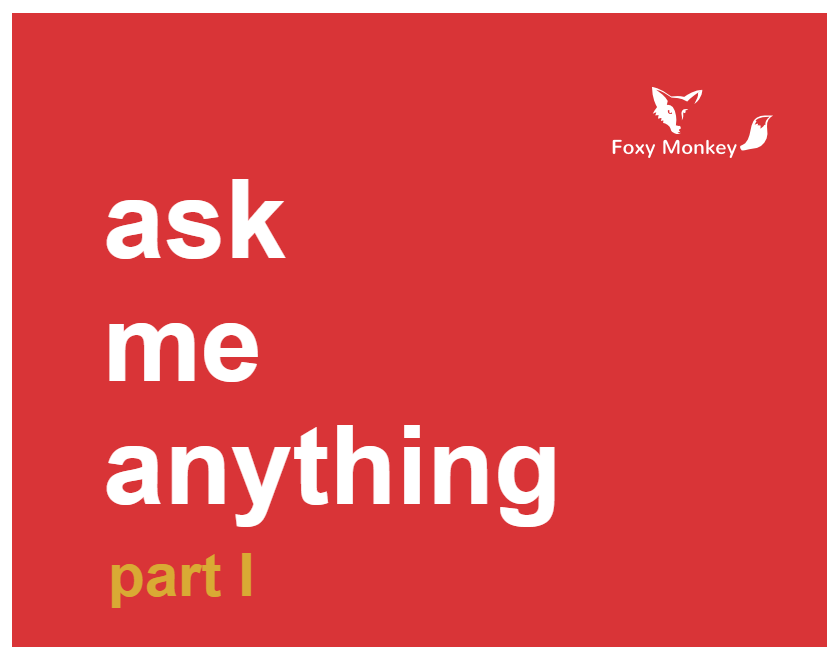
I enjoyed receiving so many reader questions and I promised I would answer every single one of them! So here are my “Ask me anything” answers.
This is not a huge blog with millions of subscribers. So luckily I received just about the right number of questions. 22 to be exact!
If you’re one of them, thank you! I’m grateful to be in that position and want to help as many people as possible on things I know about. I also noticed that there are more comments/email replies coming in lately which is great. It starts to form a community of its own instead of me grabbing the mic and talking on my own.
Please note, I wanted to answer each question properly. Therefore, I split the questions in 2 blog posts organised by subjects. Part 2 is coming in a week’s time and focuses on accounting, contracting, career and side hustling. I wrote my thoughts. Now it’s time I see yours in the comments!
Investing
DIY vs paying for wealth management services – the pros and cons?
That’s a whole new blog post there for me :) I was thinking of inviting an independent financial advisor and have a debate in the future.
When you have a health problem you go to the expert. When you want to build a house you go to the builder. So why not go to a wealth manager to manage your finances?
You probably know that I like doing my own investments. That’s just me though – investing is a hobby that I love reading about in my spare time. See investing book list.
But unlike other FIRE enthusiasts, I can clearly see the value of having a financial advisor guiding you and managing your wealth. However, as our fellow blogger Young FI guy puts it, there is an advice gap. Simply put, for the average person who wants to invest up to £30,000 the cost of an advisor is just too high. That’s because advisors are usually paid a percentage of the money you invest with them. Therefore the average investment is not so attractive to them. I’m sure there must be people charging a fixed-fee on Unbiased.com but it’s clearly a problem.
Now you may ask, what is a high fee? For me anything above 0.5% a year would rank high for wealth advice. It really depends how often you meet, how you engage with them (do they spend 2 hours talking to you in detail every quarter?) etc.
A good financial advisor is not there to only tell you where to invest. Although that’s an important part. They’re there to assess your risk profile and based on your goals, design an investment strategy tailored to you. Not only design, but more importantly, hold your hand when going through the storms. To hold you accountable and make sure you don’t succumb to your human biases of buying high and selling low! I think the behavioural aspect of it is worth paying for, but hard to do so without paying hefty fees.
Would you keep your savings on premium bonds or would you buy second property these days?
Did you know that Premium Bonds were introduced by Harold Macmillan in his Budget of 17 April 1956, to control inflation and encourage people to save [Wikipedia]? As you probably know I’m all up for saving and controlling inflation! But I don’t think premium bonds is the way to grow one’s wealth. It’s a zero-risk way to achieve a greater than zero savings rate if that’s what you want.
As of December 2017 premium bonds paid out a 1.4% annual interest in the form of prizes. Premium bonds do not pay interest (thanks Laura!) and whether you earn something or not is based on luck. After doing some calculations, a person with average luck would get £100 for every £10,000 invested, or £500 for £50,000 per year. That’s 1%.
Now 1% is not bad but it’s not even keeping pace with inflation. Of course, you may have
A second property might be more attractive. But you’ll have to do the math and see what your expected returns are after tax. I certainly believe property has a good future – maybe not in
Premium bonds, however, might work for someone that needs zero risk, tax-free chance to earn money. Not to mention the zero hassle compared to property.
So it all depends on your profile. If you can satisfy your investment goals with ~1% returns (premium bonds) then there’s no reason to take more risk. Otherwise, I believe there are better investments out there to grow your wealth.
PS: You can right now get 1.5% in Marcus current account of Goldman Sachs.
You recommended a book called “own the world” which I read. He recommends gold as a hedge. Do you own gold and if so, what %age of your portfolio is it?
It’s a great book. Here’s my review of the How to Own the World book. Part of why I chose it was to understand gold as an investment. But it didn’t convince me gold is a promising one.

I understand that investors “flee for safety” when crises happen. Gold is a concrete form of wealth that behaves totally different to equities. But the reason I have avoided it so far is because it’s not an income-producing asset.
In other words, gold does not give us any cashflow. Which brings me to the second problem of not knowing how to value it. Is $1300/oz cheap or expensive? Is history any guide? A share price, for example, is a multiple of future earnings discounted to today. Usually, people use ratios like gold to house prices, gold to Dow Jones. In the past 10 years, these ratios have gone to extremes suggesting that gold is undervalued. In my view, gold is a commodity that increases with inflation. Adding a small share of gold to a portfolio will reduce its volatility but will not produce superior returns. Ray Dalio also recommends a 5-10% gold allocation!
Honourable mention: if you decide to buy gold, BullionVault is one of the most legit ways to hold physical gold (insured). Costs here. Then you also have ETFs such as GLD (0.40% OCF).
I currently have almost 90% of my money in 10 sites of P2P Lending/Crowd Investing and the remaining in index funds: iShares MSCI World EUR Hedged UCITS ETF (Acc), OCF 0.55%. Since I am 42, do you think it makes sense, I mean the returns on P2P have been more than 13%, should I at some point change this allocation? If so, do you recommend keeping this fund or for instance use the cheaper non-hedged version? iShares Core MSCI World UCITS ETF (Acc) NON-HEDGED OCF/TER: 0.2%.
And about the allocation of the index funds themselves, sometimes I think I should have some exposure to Emerging Markets, at least India, not sure it is a good idea. I suppose my time horizon is greater than 30 years still :)
Having 90% of your allocation in peer-to-peer lending is very risky in my opinion. First of all, p2p lending platforms are quite new (<10 years old) and have not been tested during a recession. As the markets go up everyone is making money. But what when the market gods decide to go the other way and some people lose their jobs? Will they pay their mortgage or their p2p loan?
This is precisely the time when you will need cash and quality assets to deploy to the cheap stock market and I’m not sure p2p lending will pass the test.
It’s only when the tide goes out that you learn who has been swimming naked.
Buffet says
Another risk I see in having 90% in p2p is geopolitical. You probably have 90% of your wealth in one (maybe few) countries. But what if this country fails?
13% return is great but risk is all those things that could happen but didn’t happen. I also invest in peer-to-peer lending as I like the steady returns in a low-return environment. But I allocate max 10% of my net worth there.
Regarding iShares World hedged vs the non-hedged version, studies have shown that hedging doesn’t really make a difference in the long term. That’s because the returns balance out. But if you want to reduce your risk or you’re close to retirement maybe it makes sense to hedge.
If it was a fixed income asset, currency volatility would play a much bigger role. Which is why usually people hedge bond funds. And yes! Emerging markets do contribute to the world’s GDP.
What is your approach to pension investments? What do you advise? I currently read “Smarter Investing” from Tim Hale. Good reading so far for newbies like me.
First of all, I’d like to thank S. for including this in the original question:
“Reading you is always an ice-cream for me 😁”.
I mean… How can I NOT answer that!
A pension is something very important. Most people don’t know
1) how much they have in their pensions or how much they contribute
2) where it’s being invested
3) what the fees are
If you belong to one of these groups it’s time to fix this! Seriously, this is important. Your future self will thank you. These questions are easy to answer if you ask your employer.
You asked about me. I used to be a full-time employee and also not aware of how pensions work. In fact, I couldn’t answer any of the above questions! But then when I switched to self-employed so I was forced to learn.
I’m running my own pension but not everyone has to. I have a SIPP and contribute monthly straight from my company account. The benefit of doing this is that I don’t pay any corporation tax since pension counts as an expense. I will be able to access my pension at the age of 55 (57 after 2028).
If you’re an employee, you should definitely take the percentage your employer offers to match (e.g. 6%) and run! It’s essentially free money. You can also set up a self-invested pension scheme (SIPP) apart from your company’s one and contribute. The government will always add 20% in tax relief to your pension. So if you put £8,000 in your pension, the government will add an extra £2,000, bringing the total amount to £10,000. That goes to 40% (!!!) if you’re a high-income taxpayer (earn more than £45,000). HL
I’m with BestInvest for my SIPP but I don’t like it since they’ve recently added a £120 admin fee per year. That’s on top of the 0.3% they already charge for platform fees. Choosing a platform depends on the size of your pension, but for anything over
@G.: I put 10% of my savings towards my pension but that’s just me. That’s because I want to have the flexibility of using my spare cash in other projects until I hit 57. But I’m paying a 20% “penalty” for this flexibility in terms of paying corporation tax (the equivalent of not getting the government bonus available for employees).
Do you invest in Crowd Funding, or as a Startup Angel investor or similar? If so, what is your experience and which companies have you invested in?
Yes, I have indeed invested via Crowdcube but not much – around 2% of my portfolio. I have high hopes for Freetrade as Robinhood (the US equivalent) has mooned! But despite the huge returns private equity may offer, the chance of getting them is quite low. So don’t get too excited about investing in startups, unless you really know them or are involved in the business.
Have you heard of Wise Alpha? It would be really cool to hear you intake on it.
I have heard of Wise Alpha as they have approached the blog before launching their robo-advisor. I like the idea of picking your own investments but I believe there must be a limit. It’s great to pick asset classes but with Wise Alpha, you go down the level of picking your own corporate bonds.
That gives you great power which comes with great responsibility. Are you able to judge whether, say a 5.6% yield on company X is appropriate for the company? Are you able to read its balance sheet or other information and come up with a sensible number? Or is it a matter of investing in companies just because you know them and hope they don’t go bust?
Not sure which category you fall into. But I know that if I want to invest in corporate bonds I will probably pick a low-fee corporate bond fund.
Life
How is life expecting a baby??? Are you nervous? Happy new year!!!
First I thought my distant friend is trolling me. But then I told myself, what if not? So I’ll add it as a question :) Yes! We’re expecting a baby! Goodbye sleep, goodbye free time!
I guess that puts us in a different bracket. No longer I’m a DINK (Double Income, No Kids). Most likely first a SISK and then a DISK? Ermm.. whatever! I’m confused. Life is great, Kyriakos! I’m not nervous at all. Another great advantage of financial independence… When your finances are sorted, that’s one less thing to worry about when priorities change.

You shall not write! Replace cat with baby.
Keep my flat, and buy out of London? Or sell flat and buy within London?
From an investment point of view, I don’t see a difference in buying in or out of London. I’ve registered my thoughts about London property before and I must say they’re not rosy!
But in short, I think property will do well in Britain regardless of Brexit. Northern cities keep growing. Net migration sits at the same levels as before, therefore keeping the housing demand very high. London and the southeast are a different story in my view. They have borrowed from the future and the likelihood of high property gains is low. That’s simply because the average price compared to the average wage is at an all-time high! 14x the wages, compared to a historical 6-7 which is simply unsustainable. But who am I to say? A -0.8% annual drop (Nationwide housing report Page 3) is actually better than expected.
Personally, I’d move out of London, especially with kids, but hey… Try to convince my wife! She gets a nosebleed if she leaves Zone 2…
I’m a believer in financial education in schools and also for adults who feel they are lacking the knowledge. Are you aware of any charities that work in this area? Or any government moves to integrate it into the curriculum?
I firmly believe that personal finance should be part of education but it’s not. Therefore we need to educate ourselves and our kids about the importance of avoiding bad debt, the power of saving, investing and spending.
If any readers can answer this please do comment! I’m not aware of any charities or the curriculum.
My friend got into lots of debt (about £70k) a few years ago and I got him onto a debt management plan back in 2012. So, it’s seven years on and not much has been paid off the debts, I think he only pays about £20 per month. I think about 4 out of the 5 debts have been sold on to other companies. It looks like he will come into a lump sum and could make an offer to clear the balances. I’ve been trying to find out what would be an acceptable amount/percentage to offer. I’ve been hunting around the internet to see if there is any info to say what these companies will generally accept to clear the debts in a long-running situation like this.
The truth is, I know nothing about debt or debt consolidation plans and you probably need to talk to people who have done it or post on the Moneysavingexpert forum
Debt can be a big psychological burden. I know because my friend is £20k in the red – credit card debt. She managed to save up now and she’s slowly reducing it by cutting on spending every month. She’s just paying down the balance in full.
You may want to ask my fellow blogger DebtCamel on full & final settlements. Sorry, I can’t be of more help and good luck to your friend. Readers who know more on the subject or know people could help here.
I wrote my thoughts. Now it’s time I see yours in the comments :) Email is not visible when you comment and you can put whatever name/email.
Disclaimer: None of the above should be considered investment advice. I have not considered your personal situation and you should seek professional help. I’m just a random guy on the internet. As always, do your own research.









5 thoughts on “Ask Me Anything (Part I)”
Hi. Haven’t read the whole post yet, but just wanted question your premium bonds answer. I own premium bonds, and they don’t pay interest. The interest that the NS&I website talks about is the interest that they (NS&I) get on your money which they use to form the prize fund each month. If you put £10,000 in and get no prizes, a year later, you’ll still only have £10,000.
Now off to read the rest of your post – I always like seeing Q&As!
Thanks, Laura, you are right! I mistakenly thought the 1.4% annual interest is paid out but that’s the bucket from which prizes are drawn. This makes the case even worse for premium bonds vs property or other investments. I’ve corrected my answer, thanks again!
Also since you’ve invested in premium bonds, how do you find them? I couldn’t find a strong case for owning them. I can’t put a price on the thrill of winning big though :)
Some great questions and answers.
However, I’m not sure it makes sense to compare premium bonds to property or other investments because premium bonds are not ‘investments’. They’re equivalent to cash, eg like cash you hide under your mattress, except there’s no chance to win a big monthly prize.
Premium bonds are risk-free, absolutely liquid and are tax free. If you had the cash in a Marcus account, there’s an interest amount threshold (£1k for BRT or £600 for HRT) before you start paying tax, though I guess you have the certainty or receiving said interest, whereas there is no guarantee you will win a prize with the premium bonds.
FYI, I hold investments, property and premium bonds, they’re not mutually exclusive! The premium bonds represent the cash element of my portfolio (around 10%).
While my investments all went down these past few months, my premium bonds stayed the same (albeit eroded by inflation).
Thanks Weenie. The “bonds” part of the “premium bonds” name might be the reason people treat them as investments. And in my view, they are.
But as you rightly said, you don’t have to treat the comparison as black and white. It’s human nature, however, to ask questions that demand an all-in or all-out answer. Like “Should I be in stocks or not?”.
I agree with you. There is a place for both property and premium bonds.